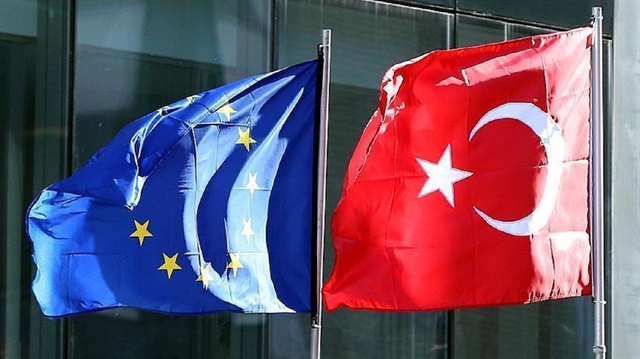
Finland, Lithuania FMs turn down recent calls by German politicians to block Turkey’s EU accession talks amid tensions
EU members Finland and Lithuania have opposed Germany’s move to suspend Turkey’s EU membership talks amid recent tensions between Ankara and European capitals.
Speaking to reporters ahead of an informal EU foreign affairs meeting in Estonia on Thursday, Finland’s foreign minister Timo Soini voiced his country’s support for the continuation of Turkey’s EU membership process.
"I think that it is always useful to have a dialogue," he said and dismissed cutting negotiations with Turkey despite "problems".
“If we do not talk to each other, this is not a very constructive way to go forward,” he added.
Lithuania’s foreign minister Linas Linkevicius also turned down recent calls by German politicians to end Turkey’s EU talks, and warned that such a move could have counterproductive consequences.
“We should continue the process and the engagement, “ he stressed.
The future of Turkey’s EU membership talks has become a major topic in the German parliamentary elections campaign on Sept. 24.
German Chancellor Angela Merkel, who is running for re-election, promised on Sunday to raise the possibility of suspending or ending Turkey’s EU membership talks in discussions with her counterparts, at a summit in Brussels next month.
The surprise move came after she was pressured by her rival, Social Democratic Party (SPD) leader Martin Schulz, at a televised debate on Sunday, where the SPD leader called for immediately halting Ankara’s EU membership talks and freezing its €4 billion ($4.68 billion) in pre-accession funds, due to recent tensions between Ankara and Berlin.
Ties between Ankara and European capitals have been strained since the defeated coup attempt in Turkey last year as Turkish leaders accused European countries of failing to show strong solidarity with the Turkish government against the attempted military takeover.
Turkish officials have also criticized Germany, Belgium, the Netherlands and several other European countries for turning a blind eye to outlawed groups and terrorist organizations hostile to Turkey.
European officials, however, voiced concerns over the rule of law and human rights issues amid widespread investigations by Turkish authorities into the Fetullah Terrorist Organization (FETO), which Ankara aacuses of having orchestrated the defeated coup attempt.
Despite Germany’s move to adopt a harsher tone towards Turkey, so far only Austria has openly backed freezing Turkey’s EU membership talks.
On Wednesday, Estonian Foreign Minister Sven Mikser, whose country currently holds the rotating six-month presidency of the EU, warned against hasty decision on Turkey.
“All decisions about the future of EU-Turkey ties should be considered very carefully, and they should not be taken during election campaigning,” he said.
Any decision to terminate Turkey’s membership talks would require unanimity among all EU member states which is seen as unlikely by diplomats as most member states were opposed to such calls earlier this year and insisted on maintaining dialogue with Ankara.
The EU can temporarily suspend negotiations with Turkey if a majority of its member states back such a proposal, which can be initiated by the European Commission or by one third of the member states.




